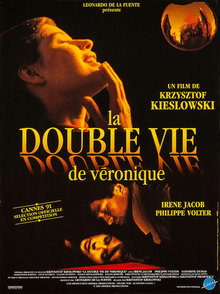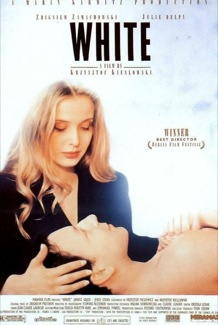I skipped a couple of days' postings because I wanted to watch all three films in Kieslowski's trilogy before writing about them. The trilogy was once a big deal, earning Kieslowski multiple awards, but I think its reputation has faded a bit. It's remarkably clever in its play on the three colors of the French flag, and its visual use of each one in the corresponding film, and in the way bits of action are used to link the three films, but I think the cleverness sometimes results in heavy-handedness.
Blue (1993)
The extraordinary cinematography of Slawomir Idziak and the performance by Juliette Binoche carry this first film in the trilogy, which takes
liberté, the color signified by blue in the French tricolor, as its theme. Binoche plays Julie, who survives a car crash that kills her husband and daughter. Finding that she is unable to swallow the pills she obtains to commit suicide, she determines to live a completely detached life, doing nothing. Her husband, Patrice, was a famous composer, and Julie, also a composer, refuses to aid Olivier (Benoît Régent), her husband's sometime collaborator, in completing the concerto Patrice had been composing in celebration of the formation of the European Union. After sleeping with Olivier, Julie puts the estate she and her husband owned up for sale and tries to go into hiding, renting a small flat in Paris. But however much she tries to disengage herself from the world around her, Julie keeps being drawn back in. She refuses to sign a neighbor's petition to evict Lucille, a dancer in a strip club, thereby earning Lucille's gratitude. She is sought out by a boy who witnessed the fatal accident and wants to return a gold cross he found at the site and to tell her Patrice's last words -- the punch line to a joke he was telling when he lost control of the car. And she discovers that her husband had a mistress, who is carrying the child he didn't know he had conceived with her. All of this leads Julie to the realization that the liberty she had sought is illusory, that it can't be found in detachment but, to put it in terms of the tricolor, in conjunction with equality and fraternity -- treating Lucille as a equal, for example, and collaborating with Olivier to complete Patrice's concerto, which takes as text for its choral section the verses about love in 1 Corinthians. Visually beautiful with striking use of the titular color throughout,
Blue has a romantic glossiness that takes away from the grit and urgency that it might have benefited from.
White (1994)
The middle film of the trilogy is a dark comedy about an exiled Polish hairdresser, Karol Karol (Zbigniew Zamachowski), whose French wife, Dominique (Julie Delpy), divorces him because of his impotence. Still desperately in love with Dominique, Karol finds himself homeless, playing tunes on a comb and tissue paper to earn small change in the Métro. Another Pole hears Karol playing a Polish song and strikes up an acquaintance, eventually helping Karol smuggle himself back to Poland in a large suitcase, which is stolen before Karol can emerge from it. After being dumped in a landfill, Karol makes his way home to his brother's beauty parlor, and begins a long process of rehabilitation, in which he makes a fortune, and devises an elaborate plot that involves faking his own death, with which he eventually gets even with Dominique, though the revenge is bittersweet. The screenplay, written by Kieslowski with his usual collaborator, Krzysztof Piesewicz, is ingeniously put together, though the theme of
égalité is not quite so central to
White as the corresponding color themes are to
Blue and
Red. Zamachowski is impressive in his journey from victim to victor, but Delpy's role feels somewhat undeveloped. What could have attracted her to this schlub in the first place? As usual, there are some ingenious links between
White and the other two films: Juliette Binoche's Julie can be glimpsed entering the courtroom where Karol and Dominique's divorce hearing is taking place, just as in
Blue, we caught a glimpse of Delpy and Zamachowski from Julie's point of view in the same setting.
Red (1994)
Not only the last film in the trilogy,
Red was also Kieslowski's final film before his death. He had announced his retirement after the release of the film, and died of complications from open-heart surgery in 1996. The film drew three Oscar nominations, for director, screenplay (Kieslowski and Krzysztof Piesewicz), and cinematography (Piotr Sobocinski). It deserved one for Jean-Louis Trintignant's performance as Joseph Kern, a retired judge who spends his time electronically eavesdropping on his neighbors' phone calls. Irène Jacob plays Valentine, a model who encounters Kern when she accidentally hits his dog with her car. The two strike up an unusual friendship as the beautiful young woman draws the misanthropic judge out of his self-imposed exile, ironically by awakening his conscience and causing him to turn himself in to the authorities who convict him of invasion of privacy. In the tricolor scheme, red stands
fraternité, and the film delivers on the theme with Kern's emerging empathy. Again, the film links with its predecessors, both of which included scenes in which an elderly person, bent with age, struggles to force a plastic bottle into an aperture in a recycling bin. In
Blue, Julie ignored and perhaps didn't even see the person's difficulty; Karol in
Red notices but does nothing to help. Only Valentine sees and goes to the person's aid. But I find the ending of
Red a little forced, in which the survivors of a disaster at see include not only Valentine, but also Julie and Olivier from
Blue, and Karol and Dominique, who have somehow reunited despite the ending of
White.
.png)






